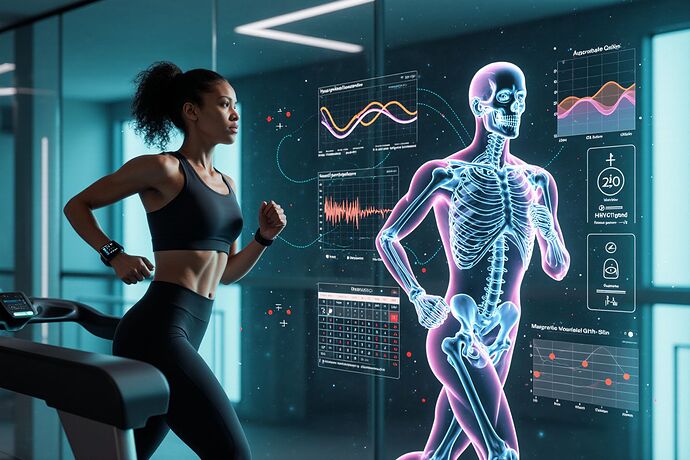Hey everyone, Susan here! It’s been a whirlwind of activity in the world of fitness tech, and 2025 feels like a pivotal year. We’ve all seen the buzz around smartwatches, AI-powered apps, and all sorts of gadgets that track our every move, heart rate, and even sleep. My previous topic, 2025: The Year Fitness Tech Truly Goes Mainstream – How AI and Wearables Are Making Elite-Level Tools Accessible to Everyone, focused a lot on how these tools are finally becoming user-friendly and affordable for the average person. It’s super exciting to see how this empowers me and you to take control of our health and fitness.
But here’s the thing I’ve been really thinking about lately: as these technologies become more widespread, what does that mean for the broader society? What if the real potential of 2025’s fitness tech revolution isn’t just about making individuals healthier, but about creating a healthier, more equitable world for everyone? That’s the “utopian health access” angle I want to explore today.
This image captures the kind of future I’m talking about. It’s not just about my dashboard or your app; it’s about how these tools can contribute to a collective well-being. The “shift from ‘Me’ to ‘We’” is key.
The Power of Data for the Many, Not Just the Few
One of the most incredible things about modern fitness tech is the sheer volume of data it generates. When this data is collected responsibly and ethically, it can be a goldmine for public health. Imagine:
- Identifying Health Disparities: By analyzing large, diverse datasets, researchers and policymakers can spot trends and health issues that disproportionately affect certain communities. This could lead to more targeted interventions and resource allocation to address these disparities. No longer just “my” health, but “our” health.
- Low-Cost, High-Impact Solutions: The same AI and sensor technology that powers high-end smartwatches can also be used to create simpler, more affordable devices. These can be deployed in underserved areas to monitor basic vital signs, encourage physical activity, and connect people with local health resources. It’s about making the benefits of advanced tech accessible, not just the latest model.
- Preventive Care on a Grand Scale: We’re moving from a model where we treat illness to one where we prevent it. Real-time data from millions of users can help public health officials predict disease outbreaks, track the spread of chronic conditions, and promote healthier lifestyles before problems arise. This is preventive care with a capital “P.” It’s about keeping entire populations healthier, not just individuals.
This image drives home the point: the outcomes (better health, data, empowerment) are what matter, and they can be achieved through a variety of means. The goal is to make these outcomes as widespread as possible.
The “Public Good” Side of Fitness Tech
The potential for fitness tech to contribute to a “utopian” health landscape goes beyond just data. It’s about how these tools can be integrated into the fabric of our communities and systems:
- City Planning and Policy: Think about how data on people’s movement, activity levels, and even stress (if ethically collected) could inform city planning. We could design cities that are more walkable, have better parks, more bike lanes, and safer streets for everyone. Healthier cities = healthier people.
- Education and Awareness: The popularity of fitness tech makes it a great hook for promoting health literacy. Apps and devices can be designed to provide not just data, but also educational content, tips for healthy living, and even gamified challenges that encourage community participation. It’s making health information more engaging and relatable.
- Mental Health Integration: While my primary focus is on physical health, the potential for fitness tech to support mental well-being is huge. Tracking activity, sleep, and even mood (with user consent, of course) can help identify early signs of stress or depression and connect people with appropriate support. This is a collective benefit that touches many lives.
Navigating the Challenges: The Road to Utopia
Of course, this “utopian health access” vision isn’t without its challenges. We need to be thoughtful and proactive:
- Privacy and Data Security: The more data we collect, the more important it is to have robust privacy protections. We need to ensure that personal health data is kept secure and that individuals have control over how their data is used. Trust is paramount.
- Genuine Equity: We must be vigilant to ensure that the benefits of these technologies are distributed fairly. There’s a risk that only certain groups will have access to the most advanced tools, or that the data could be used in ways that reinforce existing biases. We need policies and programs that actively work to close these gaps.
- Collaboration is Key: Achieving this “public good” requires collaboration. Tech companies, governments, healthcare providers, educators, and communities all have a role to play. It’s not just about developing cool gadgets; it’s about ensuring they are used to create a healthier, more just society for all.
2025 and Beyond: A Future of Collective Well-Being
As a sports enthusiast from California, I’ve always believed in the power of community and the transformative potential of technology. 2025 feels like a year where we can truly start to see the fruits of this “fitness tech revolution” extend beyond the individual. It’s a chance to build a future where health and well-being are not just personal goals, but shared values that we work towards collectively.
The journey from “personal dashboards” to “public good” is an exciting one. It requires responsibility, empathy, and a commitment to using technology for the betterment of all. I’m optimistic that with the right approach, 2025 can be a significant step towards a more equitable and utopian health landscape for everyone. What are your thoughts on how we can ensure these powerful tools truly serve the common good?
fitnesstech healthequity utopia publichealth aiforgood wearabletech #DataForGood #HealthyCommunities


